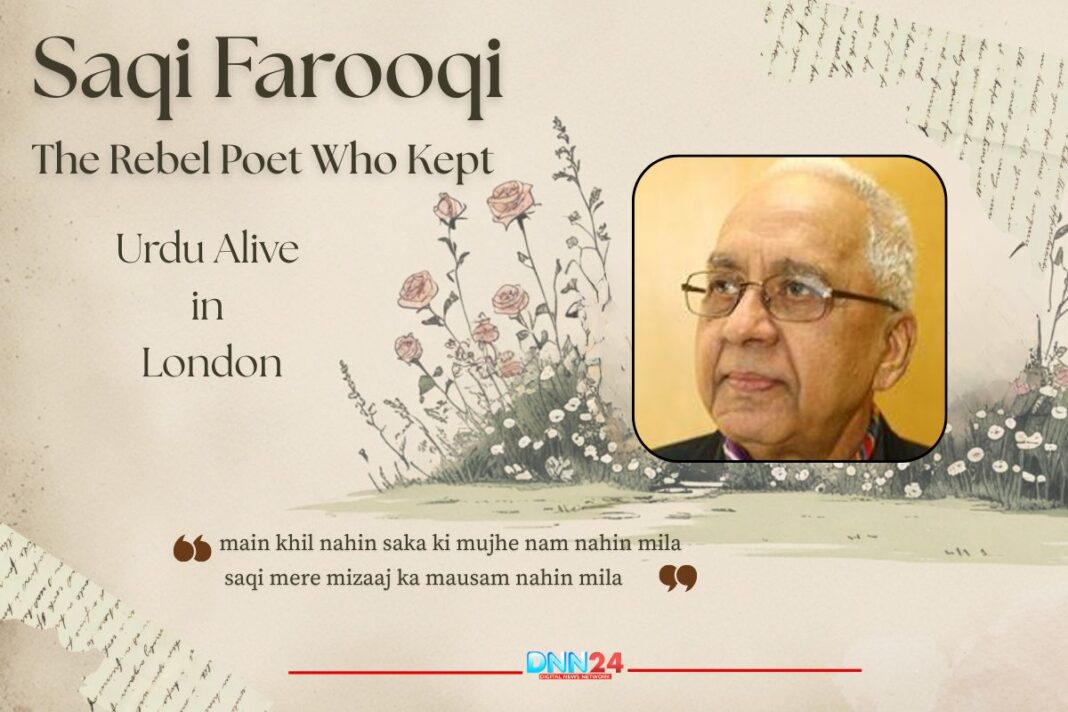When a poet chooses exile over comfort and carries an entire language across continents in his heart, what drives him? Saqi Farooqi was not your ordinary poet. He was a rebel who refused to let Urdu die in the icy winds of London. Born as Qazi Muhammad Shamshad Nabi Farooqi, this British-Pakistani poet wrote in both Urdu and English, leaving a mark in two languages that few writers can master in one.
mujhe khabar thi mera intezaar ghar mein raha
Saqi Farooqi
ye haadsa tha ki main umr bhar safar mein raha
His words were sharp, emotional, and fearless. While others wrote safe poetry for applause, Saqi wrote to shake people awake. He believed poetry should disturb, question, and force readers to confront uncomfortable truths. His journey from Gorakhpur to London was not just a geographical shift but a transformation of identity, language, and purpose. He lived between cultures, yet remained deeply rooted in Urdu’s rich traditions.
muddat hui ik shakhs ne dil tod diya tha
Saqi Farooqi
is vaaste apnon se mohabbat nahin karte
In a world that often forgets its poets, Saqi Farooqi remains unforgettable because he dared to be different. His life story reads like poetry itself, full of struggle, passion, and an unbreakable bond with words. This is the tale of a man who made sure that Urdu’s fragrance would never fade, even in foreign lands.
From Gorakhpur to the World: A Journey Begins
Saqi Farooqi was born on December 21, 1936, in Gorakhpur, Uttar Pradesh. India was in turmoil at the time, with people anxious about their future and their place in a rapidly changing world. Into this chaos, a child opened his eyes who would later become a significant name in Urdu literature. His early years were shaped by the Partition of India, an event that tore families apart and redrew borders overnight.
ik yaad ki maujoodgi sah bhi nahin sakte
Saqi Farooqi
ye baat kisi aur se kah bhi nahin sakte
His family first moved to East Pakistan, which later became Bangladesh, and then settled in Karachi. These constant relocations left deep impressions on young Saqi, teaching him early about displacement, identity, and belonging. He completed his initial education at Urdu College and graduated from the University of Karachi. But education was never enough for Saqi. There was a restlessness inside him, a hunger for freedom from social, linguistic, and intellectual constraints.
ye kya tilism hai kyun raat bhar sisakta hoon
Saqi Farooqi
vo kaun hai jo diyoon mein jala raha hai mujhe
He wanted to break boundaries, not just cross them. In 1958, he made a bold decision that would define his life. He left Pakistan for London, a city thousands of miles away from everything familiar. There, he trained in computer programming, a practical skill for survival. But his real world remained in words, emotions, and the power of language to capture human experience. London became his home, but Urdu remained his soul.
Keeping Urdu Alive in a Foreign Land
In London, Saqi Farooqi did something extraordinary. He refused to let Urdu become a relic of the past. He saw it as a living, breathing language that could express modern feelings, contemporary struggles, and universal human experiences. His famous works, such as “Behram ki Wapsi” and “Razoon se Bhara Basta,” became celebrated in Urdu literary circles. His English poetry collection “Nailing Dark Storm” also received praise, proving he could move between languages with ease.
ab ghar bhi nahin ghar ki tamanna bhi nahin hai
Saqi Farooqi
muddat hui socha tha ki ghar jaenge ik din
What made his poetry unique was its restlessness. Every word felt like he was unloading a piece of his soul onto paper. He searched for spirit in everything around him, whether human, animal, bird, or nature itself. This is why his poems never stayed confined to one emotion or subject. They contained love, pain, rebellion, and the depths of humanity all at once. Saqi belonged to that rare breed of poets who refused to see Urdu as merely a language of the past. Instead, he viewed it as the language of today and tomorrow.
mujh ko meri shikast ki dohari saza mili
Saqi Farooqi
tujh se bichhad ke zindagi duniya se ja mili
He wrote about parts of society whose voices were often suppressed or ignored altogether. His ghazals and nazms stood against narrow social structures and rigid thinking. He was a poet of open ideas, whose words carried no fear or hesitation. This sometimes made him a controversial figure, but Saqi always maintained that poetry should not only earn praise but also force people to think deeply and question their assumptions about life and society.
The Unforgettable Allahabad Visit of 1994
Saqi Farooqi’s life was filled with interesting stories. His visit to Allahabad in 1994 remains memorable for those who witnessed it. People welcomed him as “the poet from London,” curious about this man who lived in the West but spoke of Urdu. When he arrived, he surprised everyone. He wore a white shirt with red suspenders and said in a loud, powerful voice. He seemed to stand not on a stage but right in the middle of life itself.
mujh mein saat samundar shor machaate hain
Saqi Farooqi
ek khayal ne dahshat phaila rakkhi hai
Upon meeting his friends, he immediately said not to waste time and to speak directly. That evening’s mushaira completely changed the atmosphere. For two hours, he recited poetry about cats, frogs, and the fears that lie deep within humans. The emotions in his nazms touched the hearts of everyone listening. People kept shouting praises while he kept smiling.
khuda ke vaaste mauka na de shikayat ka
Saqi Farooqi
ki dosti ki tarah dushmani nibhaya kar
His performance demonstrated that great poetry requires no elaborate introduction or elaborate setup. It simply needs honesty, courage, and the ability to connect with human emotions. Those who attended that mushaira still remember how Saqi commanded the room with nothing but his words and his presence. He proved that a poet who truly believes in his craft can move audiences anywhere, regardless of language barriers or cultural differences. That night in Allahabad became part of his legend.
The Man Behind the Words
Saqi Farooqi’s personality was characterised by both harshness and tenderness. He was quick-tempered but also incredibly kind-hearted. His friends recall how he would argue and sometimes quarrel fiercely, but the next moment, he would be found lovingly petting a child or an animal. His home in London was physically in England, but its atmosphere was purely Urdu. It was filled with books, photographs, recordings of ghazals, and letters from friends scattered across the world.
namoñ ka ik hujoom sahi mere aas paas
Saqi Farooqi
dil sun ke ek naam dhadakta zaroor hai
He cooked his own meals and often said there was no difference between cooking and writing, as long as the taste was right. This simple philosophy reflected his approach to life and art. He believed in authenticity above all else. Whether preparing food or crafting a poem, what mattered was sincerity and getting the essence correct. His friends describe him as someone who lived on his own terms, never compromising his values for the sake of comfort or acceptance.
pyaas badhti ja rahi hai bahta dariya dekh kar
Saqi Farooqi
bhaagti jaati hain lehrein ye tamasha dekh kar
He could be brutal, stubborn, and uncompromising, but these same qualities made his poetry powerful and unforgettable. Saqi understood that great art requires sacrifice, and he was willing to pay that price. His life choices reflected his dedication to his craft and his refusal to compromise his artistic integrity for the sake of social acceptance or commercial success.
Poetry That Searches for the Soul
Saqi’s poetry was a search for the human soul. His nazms walked that thin line between life and death, where hope and despair exist together. He was completely different from other poets of his time. His thinking was modern, yet his roots remained deeply rooted in Urdu tradition. He saw love not just as romance but as a social and spiritual experience. His nazms demonstrated that Urdu literature is not frozen in time but constantly evolving and adapting.
vahi aankhon mein aur aankhon se posheeda bhi rehta hai
Saqi Farooqi
meri yaadon mein ik bhoola hua chehra bhi rehta hai
In his later years, Saqi’s health declined. He had to be hospitalized several times, and when his wife also fell ill, they moved to a care home. On January 19, 2018, he passed away in London at the age of eighty-one. News of his death saddened the entire Urdu literary world. Many said that Saqi had gone, but his voice remained. His poetry continues to inspire new generations of readers and writers.
tamam jism ki uryaaniyaan thin aankhon mein
Saqi Farooqi
vo meri rooh mein utra hijaab pahne hue
He proved that words, when written with truth and passion, become immortal. They outlive their creators and continue speaking to people across time and space. Saqi’s poems still resonate because they touch something fundamental in the human experience that remains unchanged despite shifting cultures and passing years.
Building Bridges Between Languages
Saqi Farooqi never saw Urdu as just a language of words but as a language of thought. He showed the Urdu world that this language was not merely ghazals read in gatherings but a document of life itself. He built a bridge between Urdu and English, proving that when the heart is true, language becomes no barrier at all. Even while living in the Western world, he never severed his connection to his roots.
main ne chaha tha ki ashkoñ ka tamasha dekhun
Saqi Farooqi
aur aankhon ka khazana tha ki khaali nikla
His poetry collection, “Raat ke Musafir,” published in 2011, contained selected works in which he wrote that he was alone but knew his words would reach someone somewhere. This belief gave him the strength to keep writing until his last breath. Today, when discussions about Urdu literature happen, Saqi Farooqi’s name is mentioned with both respect and affection. He was among those who reminded us that poetry is not just wordplay but an encounter with life.
raasta de ki mohabbat mein badan shaamil hai
Saqi Farooqi
main faqat rooh nahin hoon mujhe halka na samajh
His journey from Gorakhpur to Karachi to London was not just about places but about identity. He lived, felt, and moulded Urdu into his poetry at every destination. Saqi Farooqi is no longer among us, but his creation, his voice, and his passion remain alive. He taught us that regardless of language, if it contains truth and feeling, it lives forever.
Also Read: Ibn-e-Insha: The Urdu Writer Who Turned Laughter Into Literature
You can connect with DNN24 on Facebook, Twitter, and Instagram and subscribe to our YouTube channel.



